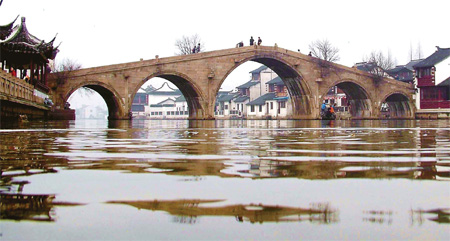Zhujiajiao awash with character
 |
| Zhujiajiao provides an authentic and less-crowded water-town excursion. |
Looking for a less crowded but still authentic water town? Then this is the place.
Water towns are popular destinations for anyone looking to get out of the crowded city, enjoy a slower pace of life, absorb breathtaking scenery and see vastly different part of China than high-rises and industrial parks.
But with the many water towns sprinkled throughout Jiangsu and Zhejiang provinces in close proximity to Shanghai, its difficulty to discern which place will offer the most authentic experience.
While Zhujiajiao resembles Zhouzhuang with its dozens of stewed pig hoof outlets; Xitang with its many teahouses and souvenir shops; and Wuzhen with its architectural features of black tiles and white bricks, its quaintness and fewer crowds is what sets the town apart.
Zhujiajiao, just a bus ride away from Shanghai, is the perfect destination for anyone seeking an authentic and less-crowded water-town excursion.
The town is small and visitors only need a day for a thorough exploration, so there's no need to have a planned route or accommodation. With small crowds, it's easy for visitors to enjoy a nap in a cozy armchair in a teahouse.
While it doesn't have as many landmarks or historical sites like other water towns, visitors won't be bothered with an onslaught of information about each and every attraction. Instead, visitors will be able to enjoy the tranquility of the water town and do what interests them.
Zhujiajiao is a perfect place for a one-day excursion in a place quite different from but not far from the Shanghai's busy downtown.
The town may lack famous or historical sties, but there are some places you won't see anywhere else.
The Zhujiajiao Post Office dates back to the Qing Dynasty (1636-1911), carrying messages between families, business contacts and friends in China's most transitional periods. Visitors can even enjoy reading some of the letters engraved on the wall at the ground floor of the museum.
The letters give a glimpse into what life was like hundreds of years ago and will stir a variety of emotions. One letter from a desperate father to his son in the late Qing Dynasty may make visitors laugh. It reads, "I spent my entire life making and saving the money you are using, but you waste my efforts on opium and in whorehouse. If you don't behave yourself, I will stop sending you a stipend!"
Some may cause a bit of anger: "Huifang (writer's wife) is dull, I am afraid that she wouldn't make you happy. You can just blame her as you wish", reads another letter.
Walking through the town, visitors will enjoy the stark contrast between the black and white houses, and the goods sold on either side of the walkway contrast as well. From cafes and boutiques selling drinks and handcrafts, like a silk handkerchief for 1,000 yuan, to shops offering baked beans, cheap handcrafts and even live turtles, visitors can buy a variety of goods.
When the signs of hunger and the taste for tea can no longer be avoided, try the A-po teahouse, a two-story restaurant that exhibits champion plaques for the top-ranked scholars through the dynasties.
The teahouse offers not only the best view of the town but also the best sounds. Pairs of local singers perform live shows in the teahouse. The pairs, in plain cloths and shoes, are usually husband and wife or sisters whose complimentary voices add a soothing ambiance to the already relaxed teahouse. While the language maybe incomprehensible - they sing in the town's local dialect - the melodies will linger in one's mind long after they leave.
 0
0 







Go to Forum >>0 Comments